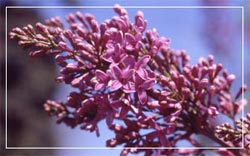Scientists' Corner
Apply for a Pair of Cloned Lilac Plants
29 March 2005
Dear GLOBE Schools:
 We have a wonderful opportunity available for GLOBE schools! GLOBE schools can apply to receive a pair of cloned lilac plants for the Common and Clonal Lilac Special Measurement. This opportunity is limited to schools in the United States, primarily because it is extremely difficult and costly to send plants to other countries and have these plants arrive healthy. In the past, lilacs were sent to numerous countries, and unfortunately, most died. Schools in Europe may buy clonal lilacs from a nursery in Germany. If interested, please contact:
We have a wonderful opportunity available for GLOBE schools! GLOBE schools can apply to receive a pair of cloned lilac plants for the Common and Clonal Lilac Special Measurement. This opportunity is limited to schools in the United States, primarily because it is extremely difficult and costly to send plants to other countries and have these plants arrive healthy. In the past, lilacs were sent to numerous countries, and unfortunately, most died. Schools in Europe may buy clonal lilacs from a nursery in Germany. If interested, please contact:
Mr. P. Mueller-Platz
Koelner Strasse 95
41812 Erkelenz / Germany
Tel: (+49) 02431-96510
Fax: (+49) 02431-73501
e-mail: info@pmueller-platz.de
Prof. Mark D. Schwartz at the University of Wisconsin, Milwaukee is the Principle Investigator for the lilac protocol. Prof. Schwartz is an expert in the field of phenology, the study of how plants and animals respond to changes in seasons and climate. He and other scientists are creating a network of lilac plants (and other types of plants) to examine regional and global patterns in phenology.
Up to fifty US GLOBE schools will be selected and given two clonal lilac plants. Selection will be made from geographically diverse areas where the lilacs are likely to grow successfully. Preference will be given to schools making the GLOBE Chief Scientist's Atmosphere Honor Roll. To be eligible, a school must commit to participate in this special project for a minimum of five years and also must plant and observe at least two common lilac plants. The common and clonal lilacs must be planted next to one another so that they will experience the same climate conditions.
To apply for cloned lilac plants, please send your GLOBE School name, mailing address, GPS coordinates and a written statement of commitment to participate in this research for five years from the school principal or other appropriate authority to Prof. Schwartz (email: mds@uwm.edu or Fax: (414) 229-3981). The deadline is April 15, 2005
Please note that even if you are not selected for the clonal plants, you can still observe the budding and flowering of common lilacs, which can be part of a collection of plants in a phenological garden. GLOBE now has a new protocol, Phenological Gardens, that shows students how to study the budding and blooming of selected plant species throughout the year. Lilac and the other GLOBE phenology observations (Green-up, Green-down, Budburst and Hummingbirds) are inexpensive and fun ways to learn about plant and animal interactions with the atmosphere, soils and land cover.